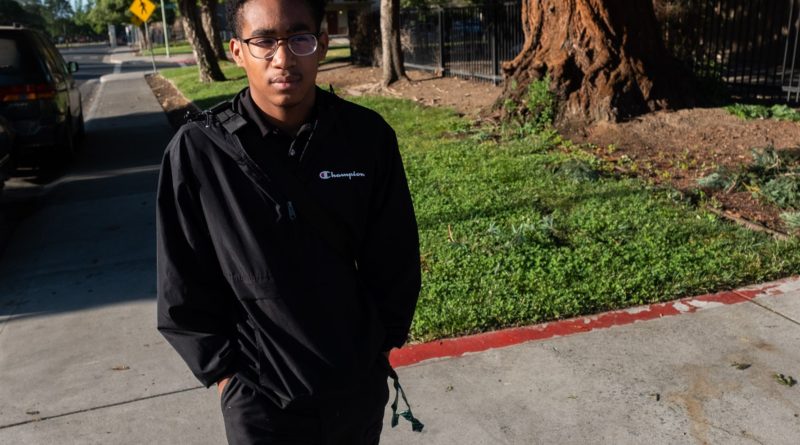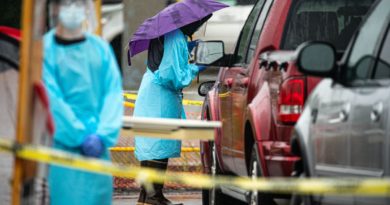COVID-19 Experience Split Along Race, Income In Sacramento Region
Few people have been unscathed by the coronavirus that has taken tens of thousands of lives, roiled the economy, and plunged the nation into a new physically-distant world.
But if you ask Sacramento-area residents about how their individual households are faring, the fear and uncertainty they’re feeling, and even about what information they trust, you’ll get a different picture of how the pandemic is affecting their lives depending on their race, ethnic background or economic status.
In mid-May, CapRadio and the non-profit Valley Vision polled residents of the eight county capital region, including Sacramento, San Joaquin, Solano, Placer, Yolo, El Dorado, Yuba and Sutter counties.
The survey found, among other things, that Black residents are more likely to have had their income slashed during the pandemic, and are more likely to be concerned about getting COVID on the job than their white and Asian neighbors. People who identified as Latino in the region are also suffering more economically than what Sacramentans reported overall.
When broken down by economic status, the disparities persist. The lowest-income earners were the most likely to be very concerned about getting sick on the job, whereas those with the most comfortable salaries are the least likely to be worried.
“It doesn’t surprise me at all,” said Saba Waheed, research director with UCLA’s Labor Center, about CapRadio’s finding about the pervasive fear among Sacramento’s working poor.
“They didn’t really have the choice not to work, they didn’t have the option to work from home. And so, it basically puts them way more at risk than higher income people who had way more options.”
Here are some of the key takeaways from the poll. You can find all of our reporting on the poll’s findings here.
Overall, almost half of Sacramento-area residents said their income has gone down during the pandemic.
And for some, that decline has been significant.
For Black residents in the greater Sacramento area, 62% said their income declined somewhat or significantly. People who identified as Hispanic or Latino reported the same rate of lost income. (Note: Poll respondents could identify as being both Hispanic or Latino and a race such as Asian, Black or white.)
White Sacramentans were less likely to feel the economic pinch during these times. Some 39% of Caucasians reported any income loss, whereas 53% of Asians have had a decrease in their cash flow.
While the majority of Sacramentans expressed some level of concern about personally contracting COVID, Asian and Black communities were more troubled on average.
More than half of Asians in the Sacramento area said they were “very concerned.” That’s more than their Black or white counterparts. Asians were also much more likely to be highly distressed about a family member catching the virus.
Asians also overwhelmingly said society needs to stay focused on stopping the pandemic, significantly more than the whites or Black Sacramentans surveyed.
I am worried about family members and friends dying. I have family and friends in health professions, one who is working in a hospital COVID-19 unit.
A majority of workers are concerned about getting coronavirus on the job.
More than two-thirds of Sacramento area residents who are still working expressed some level of concern about getting the novel coronavirus on the job. And Black respondents were notably more concerned than other races.
Half of very low income-earners — people in households bringing in $30,000 or less — are very concerned about getting COVID-19 at work, whereas half of high income-earners — in households making $150,000 or more — said they were not at all concerned about getting infected while working.
Most middle income earners were at least a little concerned about getting sick from work.
Many people said they were experiencing stress, anxiety and depression due to the pandemic.
Most Sacramento-area residents, 84%, said they felt stress or anxiety at least one day out of the week because of the pandemic. And nearly two-thirds said they were depressed about it at least one day of the week. About a quarter of respondents felt stressed about it most days of the week.
Black residents had the highest levels of anxiety and depression related to COVID-19 when compared to other races and Sacramento as a whole. Whites had less mental stress than the regional average.
People who identify as Hispanic or Latino also had very high rates of anxiety and depression, higher than the regional average, because of the pandemic.
Extremely stressful to see empty shelves in the grocery stores. Economically, we have had a cut in our income and have not had any money from unemployment come in (applied in March!). More layoffs are coming to husband’s job. It is so hard to not be able to meet at church
Workers in the Sacramento area want to keep working at home.
About a third of Sacramento residents who are still employed said they were working at home at least part of the week before the pandemic. But when they were asked about the future, about 65% said they would like to keep working at home two days a week or more even when it’s safe to return to the office.
Most people who are still working said they like the idea of eliminating their commute to save time and money. Others liked the flexible hours, spending more time with family, and the ability to control their own work environment.
The pandemic has shown many employees can work from home despite businesses saying otherwise previously. If one-third of employees could work remotely, we could have less cars/pollution and smaller office building footprints.
Despite all that, many people also shared hopes for change.
For those who chose to share some thoughts with CapRadio and Valley Vision, many shared hopes for other changes to be born through the pandemic.
Residents expressed desire for the pandemic to produce more social cohesion, stronger family ties, better governmental preparedness, and improved public health.
“[I’m] hoping people will attach more value to what is truly important in life such as togetherness and relationships,” one anonymous survey respondent opined.
Others expressed appreciation for an opportunity to slow down, or rebalance their everyday lives.
Editor’s note: The poll was a partnership between CapRadio and Valley Vision, and administered by Sacramento State’s Institute for Social Research.
CapRadio provides a trusted source of news because of you. As a nonprofit organization, donations from people like you sustain the journalism that allows us to discover stories that are important to our audience. If you believe in what we do and support our mission, please donate today.




